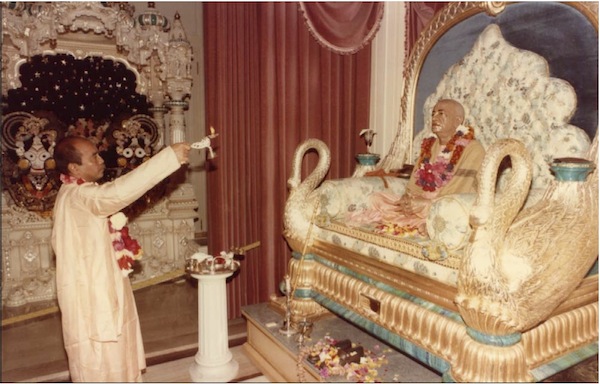
 hagavata Sevarpanam means an offering of service unto a Bhagavata. The Vedic literatures explain that there are two Bhagavatas, the book Bhagavata (Srimad Bhagavatam) and the person Bhagavata (Pure Devotee). They are both representatives of Bhagavan, the Supreme Personality of Godhead. The Srimad Bhagavatam, considered to be the ripened fruit of the tree of all Vedic knowledge, states in verse 1.2.18:
hagavata Sevarpanam means an offering of service unto a Bhagavata. The Vedic literatures explain that there are two Bhagavatas, the book Bhagavata (Srimad Bhagavatam) and the person Bhagavata (Pure Devotee). They are both representatives of Bhagavan, the Supreme Personality of Godhead. The Srimad Bhagavatam, considered to be the ripened fruit of the tree of all Vedic knowledge, states in verse 1.2.18:
naṣṭa-prāyeṣv abhadreṣu
nityaṁ bhāgavata-sevayā
bhagavaty uttama-śloke
bhaktir bhavati naiṣṭhikī
By regular attendance of classes on the Bhagavatam and by rendering of service to the pure devotee, all that is troublesome to the heart is almost completely destroyed, and loving service unto the Personality of Godhead, who is praised with transcendental songs, is established as an irrevocable fact.
Rendering service to the person Bhagavata is described throughout the Vedic literatures as being superior to the rendering of service to the Supreme Lord directly. It is mentioned in the Adi Purana that the Supreme Lord has himself stated, “Those who are my direct devotees are actually not my devotees, but those who are the devotees of my servants are factually my devotees.”
The person Bhagavata will always come in the line of a genuine disciplic succession from the Lord. It is through this disciplic succession that the Divine Principle is transmitted to the humble spiritual aspirant. Sripada Bhaktisvarupa Damodara Maharaja renders his humble service through the spiritual lineage of the Brahma-Madhva-Gaudiya Sampradaya and the loving service rendered by him to his spiritual master Srila Prabhupada is a perfect example of Bhagavata Sevarpanam.